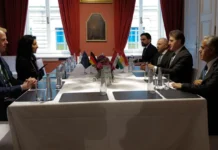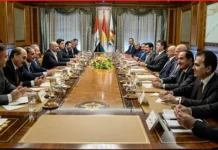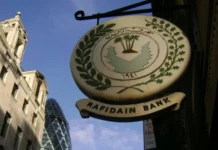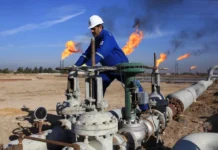Tishwash: Removing Zeros: 170 Tons of Gold and One Decision on the Table… Will the Iraqi Dinar Survive Erosion?
Amid the complexities of the financial landscape and increasing pressures on the money supply, the Central Bank of Iraq is opening the door to one of the most sensitive decisions in its modern monetary history: the project to remove zeros from the local currency.
This step coincides with the bank’s announcement that it will increase its gold reserves from 90 tons to 170 tons, representing approximately 20% of its total assets and placing Iraq fourth in the Arab world and twenty-ninth globally in terms of gold reserves.
Meanwhile, Deputy Governor of the Central Bank, Ammar Khalaf, confirmed that there is no intention to float the Iraqi dinar exchange rate in order to preserve the stability of the financial market and the national economy.
He noted that “there is an intention to remove zeros from the currency to alleviate the burden resulting from the accumulation of banknotes within the financial sector.” He explained that the goal of the measure is to reduce transportation and storage costs and improve the efficiency of cash circulation.
However, this step, which appears to be technical and reformist on the surface, has raised a wave of questions about its actual effectiveness, and whether it represents a radical solution to the monetary policy crises, or whether it is merely a cosmetic measure to relieve pressure without addressing the core structural imbalances in the Iraqi economy.
According to estimates by international monetary institutions, Iraq is currently experiencing moderate inflation of around 2.5%, a relatively stable environment compared to previous years. However, the money supply (M0) reached historic levels at the end of 2023, making cash transactions a logistical burden for banks and institutions.
Comparative studies indicate that deleting zeros is a technical accounting step that does not change purchasing power, but rather simplifies calculations and reduces errors in financial systems.
However, the success of this step depends on its integration with comprehensive economic reform, rather than a measure isolated from the overall financial reality.
Economic expert Ahmed Al-Tamimi told Baghdad Today that “the project to remove zeros from the Iraqi currency represents an important reform step that will facilitate monetary transactions and reduce administrative and logistical burdens on the country’s financial and banking system, provided it is implemented within a well-thought-out, comprehensive plan that takes into account economic and market stability.”
Al-Tamimi adds, “The accumulation of banknotes resulting from the current bulk of paper money is a significant burden on the financial sector, requiring additional costs in transportation, storage, and management, in addition to making daily transactions difficult for citizens and institutions.”
According to comparative economic approaches, countries such as Turkey in 2005 and Ghana in 2007 saw relative success in removing zeros after long periods of stability and strict financial discipline.
The move helped reduce the costs of cash transactions and boost confidence in the currency.
However, failed experiments, such as those in Zimbabwe and Venezuela, have shown that removing zeros without institutional reform opens the door to renewed inflation and undermines public confidence in the national currency.
Al-Tamimi continues, “Removing zeros will not change the purchasing power of the dinar per se, but it will contribute to simplifying the accounting and financial system and reducing significant numerical discrepancies in financial statements, making money management more efficient and easier to use within government institutions and the private banking sector.”
He points out that the success of the experiment depends on “a stable economic environment, effective control of inflation rates, and close cooperation between the Central Bank and the Ministry of Finance to ensure a smooth transition without market disruptions or a loss of confidence in the national currency.”
According to accurate economic readings, Iraq today stands at a crossroads between comprehensive monetary reform and a symbolic measure with limited impact. Removing zeros may be technically beneficial, but it becomes dangerous if perceived as an attempt to conceal structural crises under an administrative guise. Analysts warn that poor timing or poor communication with public opinion could lead to pricing confusion and possibly “silent inflationary cycles” exploited by some commercial parties.
Al-Tamimi concluded his statement by saying, “The primary objective of this step is to enhance confidence in the Iraqi dinar, facilitate financial transactions, and reduce the burdens resulting from the accumulation of paper currency. It is also a structural reform in monetary policy that should be included within a comprehensive economic reform program that serves the stability of the dinar and enhances its efficiency in domestic and international transactions.”
Modern economic analyses confirm that strengthening the gold reserve provides the central bank with moral cover for any future monetary reform. However, it does not replace financial control, strict oversight of public spending, and rebuilding trust between monetary policy and the economic community. link
Tishwash: Al-Sudani affirms Iraq’s welcome to European companies and investment in development and energy projects.
Prime Minister Mohammed Shia al-Sudani received on Wednesday the Swiss Ambassador to Iraq, Daniel Hohn, and the Swedish Ambassador, Jörgen Lindström, in the presence of the CEO of the Swedish company Linkson and the Director of the company’s Asia and Middle East branch.
Al-Sudani affirmed, according to a statement from his media office, a copy of which was received by {Euphrates News}, that Iraq welcomes and is interested in the presence of international companies, especially European ones, to work in various development sectors in light of the stability it is witnessing and the legislation and laws that support local and foreign investment.
Al-Sudani pointed out “the country’s construction and development across all sectors, including the energy sector, which requires modern technology to advance and grow, a technology available to Swiss and Swedish companies that possess extensive expertise in this field.”
The statement added, “The two ambassadors thanked Sudani for the opportunity to meet, affirmed their countries’ interest in developing relations with Iraq, and expressed the willingness of Swiss and Swedish energy companies to work in Iraq.”
The statement continued, “The meeting also reviewed Linxson’s projects, which it began operating in Iraq in 2018, including power plant maintenance projects in Baghdad.”
Al-Sudani directed “the development of a roadmap to explore the most important projects that Swiss and Swedish energy companies can implement in Iraq.” link
*************
Tishwash: I don’t know if this is right and true, don’t ask me any questions I have only read this part that is below and I don’t intend on reading anymore of it
I have not seen the VND mentioned in this but I didn’t look either
OKAY?
Document stating no taxes on Dinar and the report for Vietnam
this is the summary from section 6
FOREIGN EXCHANGE AND REMITTANCES
Foreign Exchange
The currency of Iraq is the dinar (IQD). The Central Bank of Iraq devalued the IQD, by 22.7 percent at the end of Dec 2020, to avoid a liquidity crisis. This came as part of the reform plan put in place by the Prime Minister after the country was simultaneously impacted by COVID -19 and the significant drop in oil prices at that time.
Iraqi authorities confirm that in practice, there are no restrictions on current and capital transactions involving currency exchange if valid documentation supports underlying transactions. The Investment Law allows investors to repatriate capital brought into Iraq, along with proceeds. Funds can be associated with any form of investment and freely converted into any world currency. The Investment Law also allows investors to maintain accounts at banks licensed to operate in Iraq and transfer capital inside or outside of the country.
The GOI’s monetary policy since 2003 has focused on ensuring price stability primarily by maintaining a de facto peg between the IQD and the U.S. dollar, while seeking exchange rate predictability by supplying U.S. dollars to the Iraqi market. In December 2020, the GOI announced that it would officially devalue the dinar’s peg to the U.S. dollar by 22 percent. Banks may engage in spot transactions in any currency; however, they are not allowed to engage in forward transactions in Iraqi dinars for speculative purposes. There are no taxes or subsidies on purchases or sales of foreign exchange.
the whole report is here https://www.state.gov/reports/2022-investment-climate-statements/iraq/
Here is the link for the same report but for Vietnam
I HAVE NOT READ IT AND I DON’T INTEND to
https://www.state.gov/reports/2023-investment-climate-statements/vietnam





